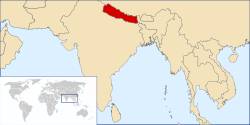| This article is part of a series on |
| Administrative divisions of Nepal |
|---|
 |
| Federal Democratic Republic of Nepal (since 2015) |
| Provinces: 7 (First level) |
| Districts: 77 (Second level) |
Local-level body: 753 (Third level)
|
|
Nepal Portal Administrative divisions by country |
| Politics of Nepal |
|---|
 |
| Constitution |
|
Government
Executive:
Judiciary: |
| Elections |
|
FederalismAdministrative divisions
|
|
Foreign relations
|
| Related topics |
|
|
A gaunpalika (Nepali: गाउँपालिका, romanized: Gāum̐pālikā, lit. 'rural municipality' Nepali pronunciation: [ɡãũ̯palika]) is an administrative division in Nepal. The Ministry of Federal Affairs and Local Development dissolved the existing village development committees and announced the establishment of this new local body. It is a sub-unit of a district. There are currently 481 rural municipalities.
History
The village development committee was the previous governing body of villages in Nepal. They were replaced on 10 May 2017 by the rural municipalities which were formed by combining different VDCs. The decision was taken by the cabinet of Nepal after modifications in the report proposed by the Local Level Restructuring Commission. Initially 481 rural municipalities were formed but it was later changed to 481 municipalities. According to the Ministry of Federal Affairs and Local Development the new bodies were to be called "rural municipality" and not "village council" which was the literal translation of the word "gaunpalika".
Structure and responsibilities
As defined by Part 17 of the Constitution of Nepal, the rural municipalities are governed by a village executive headed by a chairperson. The village executive consists of the deputy chairperson, ward chairpersons elected from each ward in the rural municipality, and four women members elected from among members of the Village Assembly and two members from the Dalit or other minority communities. Part 18 of the Constitution of Nepal states that the Village Assembly hold all legislative powers of the rural municipality. It consists of the chairperson, deputy chairperson, ward chairpersons and four ward members elected from each of the wards in the rural municipality out of which at least two must be women The members of the Dalit or minority community nominated to the Village Executive is also a member of the Village Assembly. Part 17 also includes provisions for a Judicial Committee which is headed by the deputy chairperson and consists of two other members elected by the Village Assembly among themselves. Schedule 8 and Schedule 9 of the constitution deals with powers that the local executive can execute either on its own or concurrently with the federal and the provincial governments.
Some authorities the rural municipalities have include collecting various taxes like entertainment tax, business tax and residential tax at the local level. The rural municipalities will have an annual budget of at least Rs 10 million. The rural municipalities are also a members of the National Association of Rural Municipalities (NARMIN), an umbrella organisation of the 460 rural municipalities in Nepal.
List of gaunpalikas
Main article: List of gaunpalikas of Nepal
|
|
See also
References
- "District Coordination Committee". MoFALD. Government of Nepal. Retrieved 1 June 2017.
- "गाविस/जिविस खारेज, ७ सय ४४ स्थानीय तह आजैबाट कार्यन्वयनमा". Nepal Aaja. Retrieved 12 April 2017.
- "Recently increased 22 local units published in Nepal Gazette". The Himalayan Times. Retrieved 26 May 2017.
- "481 chiefs appointed in rural municipalities". No. 18 March 2017. myRepublica. Nepal Republic Media Pvt. Ltd. 18 March 2017. Retrieved 12 April 2017.
- ^ "Government announces dissolution of VDCs, birth of village councils". OnlineKhabar English News. Retrieved 10 December 2020.
- "New local level units come into existence". kathmandupost.com. Retrieved 10 December 2020.
- "Govt prepares to add 9 more local levels in Province 2". kathmandupost.com. Retrieved 10 December 2020.
- "Gaunpalikas to be called rural municipalities". No. 15 March 2017. Himalayan Times. The Himalayan. Retrieved 12 April 2017.
- ^ "Part-17 Local Executive – Nepal Law Commission". Retrieved 10 December 2020.
- "Part-18 Local Legislature – Nepal Law Commission". Retrieved 10 December 2020.
- "Schedule-8 List of Local Level Power – Nepal Law Commission". Retrieved 10 December 2020.
- "Schedule-9 List of Concurrent Power of Federation, State and Local level – Nepal Law Commission". Retrieved 10 December 2020.
- "स्थानीय निकाय भङ्ग, सिंहदरबारकै हैसियतका ७ सय ४४ स्थानीय तह क्रियाशील". Nepal Aaja. Retrieved 12 April 2017.
- "About Us – NARMIN". Retrieved 10 December 2020.